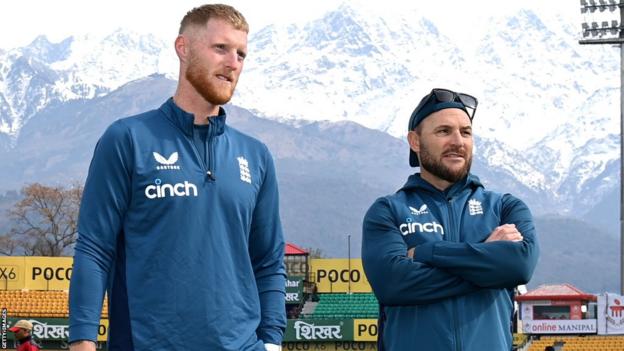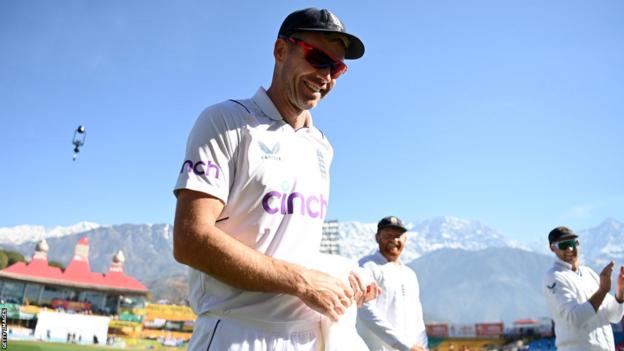[ad_1]

All good stories have an ‘all is lost’ moment.
You know the kind. When Mufasa dies in the Lion King, Ron leaving Harry and Hermione in the Deathly Hallows, Darth Vader striking down Obi-Wan Kenobi.
England are not there yet, but a 4-1 hammering in India is certainly the darkest time to date of the Ben Stokes-Brendon McCullum epic.
A tour of India can be a team-breaker. England’s defeat here in 2016 was Alastair Cook’s last series as captain. In 2021, only six of the XI beaten in the last Test in India made it to the first match of the home summer. That will not be the case this time around.
But for the first time the Stokes-McCullum axis is at a crossroads. Coach McCullum said his team had been “exposed” in perhaps his most frank exchange with the media since taking charge two years ago. If the New Zealander has been so open in public, you can be sure he has been even more honest with his players.
In fairness to Stokes and McCullum, this is their first series defeat, but they also haven’t won any of their past three.
It is right to say England have improved out of sight from the team that won only one Test in 17 before Stokes and McCullum took over, but that cannot keep being used as the barometer. Manchester City’s excuse for not winning the Premier League would not be “we used to be in the third tier”.
The questions hanging over England are being asked slap-bang in the middle of the Stokes-McCullum era. The natural conclusion is the Australia tour the winter after next. There have been 23 matches since Stokes and McCullum took charge and there are another 23 to the final Ashes Test in early 2026.
We are on the path to the Bazball series finale, a crescendo to a sporting story played out in real time. The challenge for England is to make it like Ross getting with Rachel in Friends, or David Brent telling Finchy to do one at the end of The Office. What we don’t want is the nonsense ending to Sherlock, or the underwhelming reveal of Buckles as the fourth man in Line of Duty.
How England evolve under Stokes and McCullum has always been the most fascinating part of the narrative. The summer of 2022 was exhilarating, but they cannot always be remembered for that, like a band that never managed to top its first album.
Will England move on from Bairstow and Foakes?
Any criticism of England’s Bazball batting in India is a bit of a red herring. This was their slowest scoring series under Stokes and McCullum. The problem is that when it was bad, it was horrid.
McCullum claimed England became too timid as the series progressed, but the truth is they were worked out by India’s masterful bowlers.
The likes of Ben Duckett, Ollie Pope and Ben Foakes had their minds scrambled. Their shots on what turned out to be the final day of the fifth Test in Dharamsala were horrific, a misguided attempt to “put pressure back on to the bowler”.
Joe Root returned to being Joe Root after his reverse scoop dismissal in the third Test and showed what can be done if a batter trusts their defence with a perfectly-paced 84.
England’s batting does not need and will not undergo major surgery. Of the top six that ended this series, the only change for the first Test against West Indies in July will be Harry Brook slotting in at number five, even if Pope needs a strong summer to cement his positions as number three and vice-captain.
The decisions come from number seven down. Jonny Bairstow’s returns with the bat are diminishing. Foakes is a super gloveman, but without the range of shots a number seven so often needs to shepherd the tail.
McCullum, who kept wicket in 52 of his 101 Tests for New Zealand, will know of the need to pick one keeper and stick to him. It might well be time to find the middle ground between Bairstow and Foakes, with Durham’s Ollie Robinson the next cab off the rank and Phil Salt an outside shout.
It was telling that McCullum did not unequivocally back Jack Leach as England’s number one spinner, saying Tom Hartley and Shoaib Bashir have the chance to replace him. Much will depend on Leach’s early season fitness and the amount of overs Hartley and Bashir get in the County Championship.
How long will Anderson go on?

Fast bowling is the area of the England team that is likely to change most dramatically in the latter part of the Stokes-McCullum reign. James Anderson is 41, Chris Woakes 35, Mark Wood 34 and Stuart Broad retired. Heir-apparent Ollie Robinson is 30 and regressing. Gus Atkinson, Josh Tongue and Matthew Potts are due more chances.
The decision on how to handle Anderson is ticklish for England. His physical condition suggests there is no barrier to going on and on, perhaps even to Australia, when he will be 43.
But it took Anderson eight Tests to take the final 15 wickets in his ascent to 700. Half of those were played in India, but as a comparison, Broad took 38 in his final eight Tests, Woakes took 19 in three Ashes matches and Tongue has 10 from two caps.
England need to decide if Anderson is still their best option, or if others will benefit and deliver more if given his opportunities.
More broadly, England have to get to grips with the fact they should be favourites to win pretty much every series they play outside of meetings with Australia and India.
West Indies and Sri Lanka should be swept aside in the summer. Next winter they return to Pakistan, where they won 3-0 18 months ago, and New Zealand, who they would have beaten 2-0 last year had it not been for enforcing the follow-on in Wellington.
How do England want to be remembered?
Stokes, McCullum and the entire England team need to think hard about how they want this era to be remembered. One breath-taking summer does not revolutionise Test cricket. Winning does.
Without picking on Duckett, who has been successful and is a personable character, he can be used as an example.
Duckett’s average as England opener, 43.81, compares favourably to Cook’s 44.86. Maybe this current England team would prefer Duckett’s swifter scoring, but Cook hit three hundreds in Australia when England won, then did the same again in India.
Cook is a knight of the realm, while so far Duckett has a range of bucket hats. The same goes for Pope, Leach, Robinson and Zak Crawley when compared to Ian Bell, Graeme Swann, Steven Finn and Jonathan Trott. The latter quartet all won the biggest series.
England have spent two years communicating their manifesto. We get it. We understand how they want to play, the atmosphere they want in the dressing room and how much they love playing cards. By and large, we’re on board. Now they have to win.
The credit England have in the bank means they are in still in control of what comes next. They have the luxury of writing the next chapter.
Not the beginning of the end, but the end of the beginning.
By Stephan Shemilt
Source link




